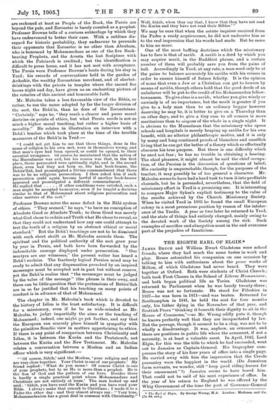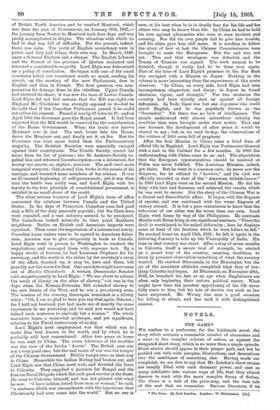JAMES BRUCE and William Ewart Gladstone were school friends, where
they had much the same tastes in work and play. Bruce astonished his companion on one occasion by talking to him with enthusiasm about the prose works of Milton, of which Gladstone had never heard. They were together at Oxford. Both were students of Christ Church ; both took First Classes in the School of Literae Humaniores ; and both began political life as Tories. Gladstone was returned to Parliament when he was barely twenty-three; Bruce was not so fortunate. He stood for Fifesbire in 1837—be was born in 1811—and was beaten. Returned for Southampton in 1841, he held the seat for four months only, his father dying in the November of that year, and Scottish Peers "thinking it beneath their dignity to sit in the House of Commons,"—so Mr. Wrong oddly puts it, though he knows perfectly well that they are incapacitated by law. But the peerage, though it seemed to be a clog, was not to be wholly a disadvantage. It was, anyhow, an ornament, and there are positions in public life where the ornament, if not a necessity, is at least a valuable asset. In April, 1842, Lord Elgin, for this was the title to which he had succeeded, went out to Jamaica as Captain-General. His biographer com- presses the story of his four years of office into a single page. He carried away with him the impression that the Creole peasantry were the happiest in the world. (Do Jamaican farm servants, we wonder, still "keep good riding-horses for their amusement " ?) Jamaica seems to have bored him. That could not be said of his next experience of office. In the year of his return to England he was offered by the Whig Government of the time the post of Governor-General • The Earl of Elgin. By George Wrong, MA. London; Methuen and Co. [7a. 6d. net.'
of British North America, and he reached Montreal, which was then the seat of Government, on January 30th, 1847,— the journey from Boston to Montreal took four days and was partly accomplished in sleighs. The situation with which he had to deal was full of difficulty. For the present, indeed, there was calm. The party of English ascendency were in power, and they had things their own way. In March, 1848, came a General Election and a change. The English Liberals and the French of the province of Quebec coalesced and returned a considerable majority. Lord Elgin was determined on a policy of conciliation. He began with one of the small courtesies which are sometimes worth so much, reading his speech, on the meeting of the new Parliament, first in English and then in French. The first question was com- pensation for damage done in the rebellion. Upper Canada had received its share; it was now the turn of Lower Canada. Lord Elgin did not feel certain that the Bill was right—in England Mr. Gladstone was strongly opposed to it--but he thought that if the Canadian Parliament passed it he could not refuse his consent. Passed it was by 47 votes to 18; and on April 18th the Governor gave the Royal assent. It had been expected that the Bill would be reserved for the consideration of the Home Government. When the truth was known Montreal rose in riot. The mob broke into the House, drove the Members out, and finally set it on fire. But the Governor was even more hated than the Parliamentary majority. The Scottish Societies were especially enraged against their countryman. The Thistle Society erased his name from its list of patrons ; the St. Andrews Society ex- pelled him and returned his subscription,—in a debenture, for money was scarce, or, anyhow, precious. The mob used more congenial weapons ; they stoned him, broke in the panels of his carriage, and wounded some members of his retinue. It was an ill-omened beginning of self-government; yet it was then that the battle was really won, and Lord Elgin, with his loyalty to the true principle of constitutional government, is entitled to no small share of the credit.
The other serious business of Lord Elgin's term of office concerned the relations between Canada and the 'United States. In the days of Protection Canadian corn had paid only a fifth of the duty generally payable; but the Corn-laws were repealed, and a vast industry seemed to be paralysed. The Canadians looked naturally to their great Southern neighbour. Duties on British and American imports were equalised. Then came the negotiation of a commercial treaty. Canadian home waters were to be opened to American fisher- men ; America was to give reciprocity in trade to Canada. Lord Elgin went in person to Washington to conduct the negotiations, and managed them with supreme tact. By a happy stroke of fortune, be had Laurence Oliphant for his secretary, and the world is the richer by the secretary's story of the affair, touched up, it may be, here and there, but possibly not the worse for that. One anecdote might have come out of Martin Chuzzlewit. A certain Democratic Senator said magniloquently to Lord Elgin : "We are about to relume the torch of liberty on the altar of slavery,"—it was in the days when the Kansas-Nebraska Bill extended slavery to the new States of the West, and he was a pro-slavery man. The hostess of the evening thereupon remarked in a silvery voice : "Oh, I am so glad to hear you say that again, Senator; for I told my husband you had made use of exactly the same expression to me yesterday, and he said you would not have talked such nonsense to anybody but a woman." The whole narrative bears a somewhat grotesque, and yet significant, relation to the Fiscal controversy of to-day.
Lord Elgin's next employment was that which was to make him best known to the world, and by which be is probably still best remembered. After two years at home he was sent to China. The causa teterrima of the troubles was the case of the lorcha Arrow.' The British ease was not a very good one; but the real cause of war was the temper of the Chinese Government. British troops were on their way to China. Meanwhile the Indian Mutiny had broken out, and Lord Elgin saw that China must wait, and diverted the force to Calcutta. They supplied a garrison for Bengal and the famous Naval Brigade which did such good service at the front. He went to Calcutta himself, and was not pleased with what he saw. "I have seldom heard from man or woman," he said, "a sentence which was reconcileable with the hypothesis that Christianity had ever come into the world." But no one is
seen at his best when be is in deadly fear for his life and for others who may be dearer than life. In China Jae had to bold his own against adversaries who were at once insolent and cunning. Nor did his own people fail to give him trouble, and his allies gave him still more. It is needless to follow the story of how at last the Chinese Commissioners were brought to meet the Europeans. But the end was not yet. This and that stratagem was defeated, and the Treaty of Tientsin was signed. The work seemed to be finished, though it really had to be done over again. Part of the time of Lord Elgin's presence in the Far East was occupied with a Mission to Japan. Nothing in the volume is more interesting than the experiences of this acute observer. "In China, on every side, Lord Elgin had seen incompetence, stagnation, and decay ; in Japan he found alertness, vigour, and strength." For two . centuries the country had been strictly shut up against all foreign influences. In Yedo there was but one Japanese who could speak English, and he was popularly known as the "Scoundrel." Yet there was no lack of intelligence. The people understood with almost miraculous celerity the novelties that were brought under their notice. That any one foresaw the development of after years it would be absurd to say ; but, as we read to-day, the observations of the visitors of 1858 seem full of prophecy.
After the first Mission to China came a brief time of official life in England. Lord Elgin was Postmaster-General with a seat in the Cabinet for a few months. In 1860 the understanding with China came to an end. The stipulation that the European representatives should be received at Pekin was never fulfilled. The American Minister, indeed, got there. But he went in a common cart; he never saw the Emperor, for be refused to "kowtow," and his visit was officially recorded as that of the "American tribute-bearer." In 1860 Lord Elgin went on his second Mission. He did his duty with tact and firmness, and achieved the results which he was sent to secure. But the story of the Chinese War is a dismal and discreditable affair. It began with the disgrace of repulse, and was continued with the worse disgrace of victory abused. It is but a poor consolation to know that the behaviour of our allies was far worse than our own. Lord Elgin went home by way of the Philippines. He contrasts Manila with Hong-kong in one significant sentence. "There the devil is worshipped in his naked deformity ; here he displays some at least of the feathers which he wore before he fell." He reached home on April 11th, 1861; he left it again in the following January to take up the Viceroyalty of India. His time in that country was short. After a stay of seven months in Calcutta, itself a severe trial of strength, he started on a grand tour of the country, meaning, doubtless, to learn by personal observation something of what the country wanted. He reached Dharmsala, in the Himalayas, but the air of the mountain altitudes completed what that of low.. lying Calcutta had begun. At Dharmsala on November 20th, 1863, he breathed his last at an age when Englishmen are often only beginning their serious political career. What might have been the greatest opportunity of his life never fully came to him, but his tale of service was such as few have surpassed. Mr. Wrong has seen a good occasion for telling it afresh, and has used it with distinguished success.
NOVELS.







































 Previous page
Previous page